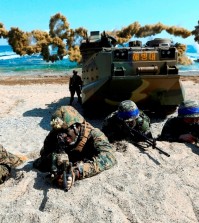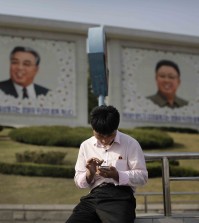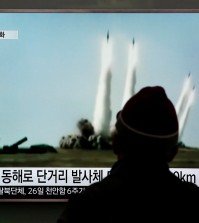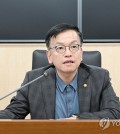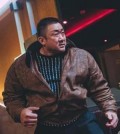- California Assembly OKs highest minimum wage in nation
- S. Korea unveils first graphic cigarette warnings
- US joins with South Korea, Japan in bid to deter North Korea
- LPGA golfer Chun In-gee finally back in action
- S. Korea won’t be top seed in final World Cup qualification round
- US men’s soccer misses 2nd straight Olympics
- US back on track in qualifying with 4-0 win over Guatemala
- High-intensity workout injuries spawn cottage industry
- CDC expands range of Zika mosquitoes into parts of Northeast
- Who knew? ‘The Walking Dead’ is helping families connect
Envoys from S. Korea, US, Japan discuss N.Korean nuke threat
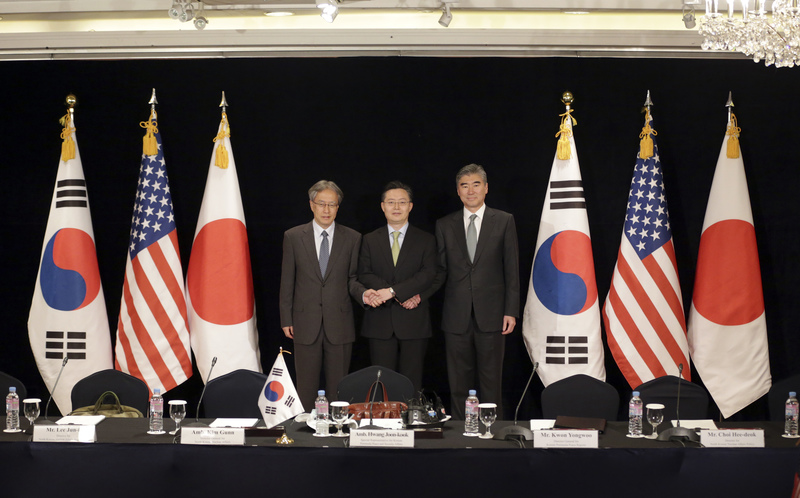
South Korea’s Special Representative for Korean Peninsula Peace and Security Affairs Hwang Joon-kook, center, U.S. State Department’s Special Representative for North Korea Policy Sung Kim, right, and Japanese Foreign Ministry’s Director-General for Asian and Oceanian Affairs Junichi Ihara pose for the media before their meeting about North Korea in Seoul, South Korea, Wednesday, May 27, 2015. (AP Photo/Lee Jin-man)
SEOUL, South Korea (AP) — The top nuclear envoys from South Korea, the United States and Japan agreed Wednesday on the need to increase pressure on North Korea and urged the country to engage in serious negotiations on its expanding nuclear weapons program.
The one-day meeting in Seoul follows a recent North Korea claim that it had tested a new type of missile from a submarine and a reiteration that it had built a nuclear warhead small enough to be mounted on a long-range missile. Outside analysts are skeptical about both claims, but they believe the North has built a small but growing nuclear bomb arsenal and advanced its missile program since international nuclear disarmament talks stalled in early 2009.
Seoul, Washington and Tokyo are members of now-dormant six-nation negotiations aimed at ending North Korea’s nuclear weapons program in return for aid and political concessions. The other members are Pyongyang, Beijing and Moscow.
Wednesday’s meetings are part of a series of such talks meant to coordinate a unified stance on North Korea’s growing arsenal. Prospects are slim that larger disarmament talks with Pyongyang will happen soon. Washington and its allies want North Korea to demonstrate its sincerity by following through with past nuclear pledges. North Korea, however, has consistently demanded that Washington and its allies recognize it as a nuclear weapons power.
“We reaffirmed our commitment to continuing the closest possible trilateral coordination and consultation,” U.S. envoy Sung Kim told reporters after the meeting. “We agreed on the importance of enhancing pressure and sanctions on North Korea even as we keep all diplomatic options on the table and open.”
South Korean envoy Hwang Joon-kook urged the North to engage in discussions in a sincere manner, warning its diplomatic and international isolation would deepen if it defiantly pushes to develop more weapons.
Worries about the North’s stability rose earlier this month when South Korea’s spy agency said that North Korean leader Kim Jong-un had his defense chief executed for disloyalty.
Hwang described Wednesday’s meeting as “particularly timely” because of uncertainty in North Korea.
South Korean and U.S. envoys are to fly to Beijing later this week to hold individual talks with their Chinese counterpart, according to Seoul’s Foreign Ministry. China is the North’s only major ally and main aid benefactor, and is often mentioned as the key to pushing the North to give up its nuclear ambitions.
U.S. officials quietly proposed a meeting with North Korea this January, before the U.S. and South Korea began annual military exercises that North Korea regards as a provocation. The two sides, however, failed to agree on who would attend and where they would meet.







